副词 almost,nearly用法辨析精选.
almost和nearly 的用法
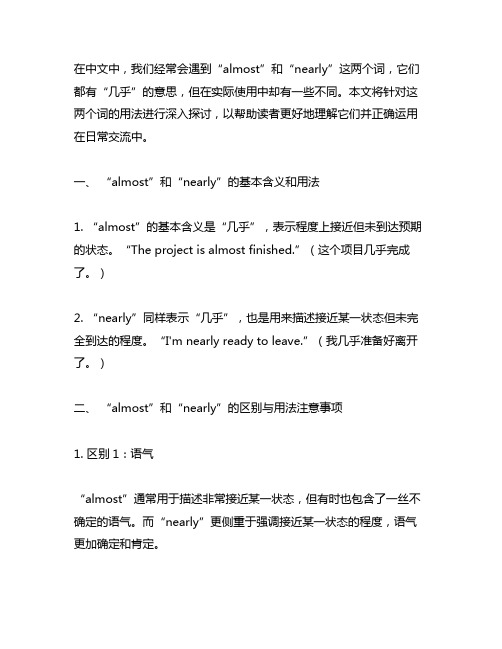
在中文中,我们经常会遇到“almost”和“nearly”这两个词,它们都有“几乎”的意思,但在实际使用中却有一些不同。
本文将针对这两个词的用法进行深入探讨,以帮助读者更好地理解它们并正确运用在日常交流中。
一、“almost”和“nearly”的基本含义和用法1. “almost”的基本含义是“几乎”,表示程度上接近但未到达预期的状态。
“The project is almost finished.”(这个项目几乎完成了。
)2. “nearly”同样表示“几乎”,也是用来描述接近某一状态但未完全到达的程度。
“I'm nearly ready to leave.”(我几乎准备好离开了。
)二、“almost”和“nearly”的区别与用法注意事项1. 区别1:语气“almost”通常用于描述非常接近某一状态,但有时也包含了一丝不确定的语气。
而“nearly”更侧重于强调接近某一状态的程度,语气更加确定和肯定。
2. 区别2:修饰词和动词的用法“almost”通常用于修饰动词,例如“almost finished”(几乎完成了),或者用于修饰形容词,例如“almost impossible”(几乎不可能)。
而“nearly”则更常用于修饰动词,例如“nearly arrived”(几乎到了),或者用于修饰数量或程度,例如“nearly all”(几乎全部)。
三、结论与个人理解通过对“almost”和“nearly”的深入探讨,我对它们的区别和用法有了更清晰的认识。
在实际应用中,我们需要根据具体语境来选择使用哪个词,以确保语言表达的精准和准确。
对于学习者来说,多阅读、多练习可以帮助加深对这两个词的理解和运用。
在日常交流中,准确使用词语是提升语言能力的重要一步。
正确理解和灵活运用“almost”和“nearly”是非常重要的。
希望本文能为您带来一些帮助,让您在使用这两个词时更加得心应手。
“almost”和“nearly”这两个词在汉语中常常被用作“几乎”的意思,但它们却有着一些微妙的不同之处。
almost和nearly的用法区别_用法辨析 英语语法.doc
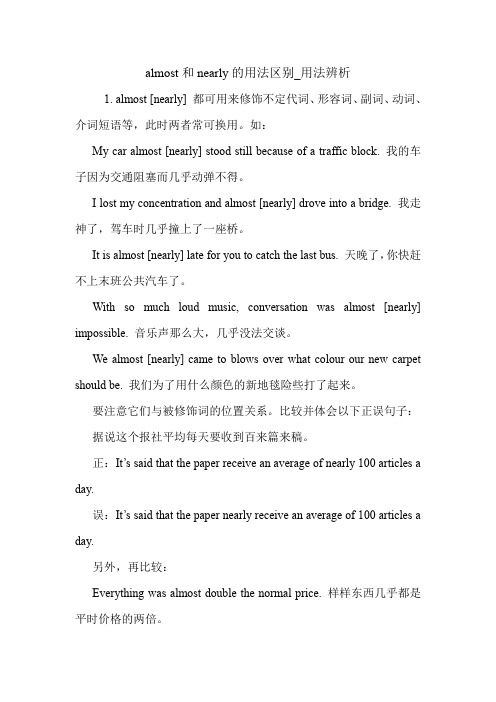
almost和nearly的用法区别_用法辨析1. almost [nearly] 都可用来修饰不定代词、形容词、副词、动词、介词短语等,此时两者常可换用。
如:My car almost [nearly] stood still because of a traffic block. 我的车子因为交通阻塞而几乎动弹不得。
I lost my concentration and almost [nearly] drove into a bridge. 我走神了,驾车时几乎撞上了一座桥。
It is almost [nearly] late for you to catch the last bus. 天晚了,你快赶不上末班公共汽车了。
With so much loud music, conversation was almost [nearly] impossible. 音乐声那么大,几乎没法交谈。
We almost [nearly] came to blows over what colour our new carpet should be. 我们为了用什么颜色的新地毯险些打了起来。
要注意它们与被修饰词的位置关系。
比较并体会以下正误句子:据说这个报社平均每天要收到百来篇来稿。
正:It’s said that the paper receive an average of nearly 100 articles a day.误:It’s said that the paper nearly receive an average of 100 articles a day.另外,再比较:Everything was almost double the normal price. 样样东西几乎都是平时价格的两倍。
Almost everything was double the normal price. 几乎样样东西都是平时价格的两倍。
nearly 和 almost 的区别
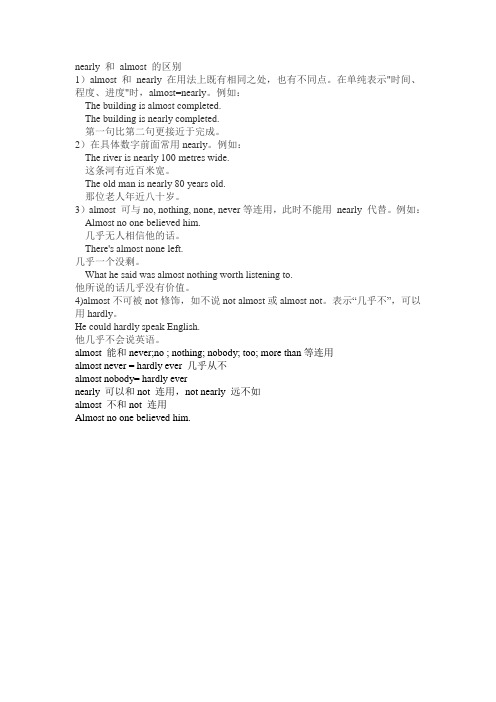
nearly 和almost 的区别1)almost 和nearly 在用法上既有相同之处,也有不同点。
在单纯表示"时间、程度、进度"时,almost=nearly。
例如:The building is almost completed.The building is nearly completed.第一句比第二句更接近于完成。
2)在具体数字前面常用nearly。
例如:The river is nearly 100 metres wide.这条河有近百米宽。
The old man is nearly 80 years old.那位老人年近八十岁。
3)almost 可与no, nothing, none, never等连用,此时不能用nearly 代替。
例如:Almost no one believed him.几乎无人相信他的话。
There's almost none left.几乎一个没剩。
What he said was almost nothing worth listening to.他所说的话几乎没有价值。
4)almost不可被not修饰,如不说not almost或almost not。
表示“几乎不”,可以用hardly。
He could hardly speak English.他几乎不会说英语。
almost 能和never;no ; nothing; nobody; too; more than等连用almost never = hardly ever 几乎从不almost nobody= hardly evernearly 可以和not 连用,not nearly 远不如almost 不和not 连用Almost no one believed him.。
almost和nearly的区别
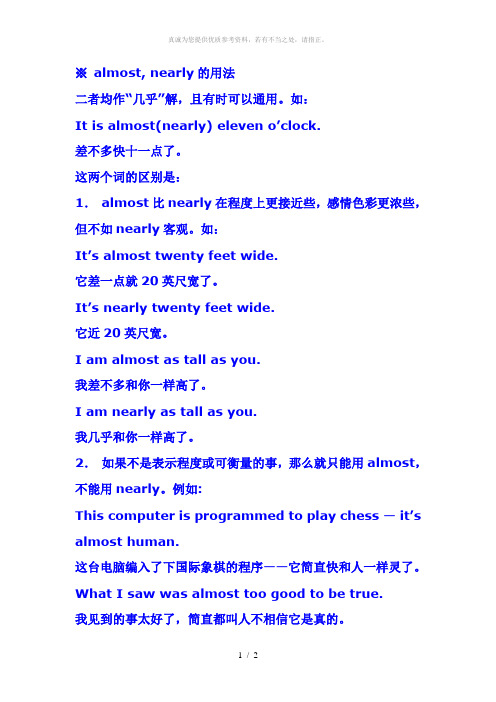
※almost, nearly的用法二者均作“几乎”解,且有时可以通用。
如:It is almost(nearly) eleven o’clock.差不多快十一点了。
这两个词的区别是:1.almost比nearly在程度上更接近些,感情色彩更浓些,但不如nearly客观。
如:It’s almost twenty feet wide.它差一点就20英尺宽了。
It’s nearly twenty feet wide.它近20英尺宽。
I am almost as tall as you.我差不多和你一样高了。
I am nearly as tall as you.我几乎和你一样高了。
2.如果不是表示程度或可衡量的事,那么就只能用almost,不能用nearly。
例如:This computer is programmed to play chess —it’s almost human.这台电脑编入了下国际象棋的程序——它简直快和人一样灵了。
What I saw was almost too good to be true.我见到的事太好了,简直都叫人不相信它是真的。
The electronic keyboard sounds almost like a piano.这台电子琴的声音很像钢琴。
3.nearly不能和never, nobody, no one, nothing, nowhere, no以及none连用,这些词要和almost或hardly连用。
例如:almost never---------hardly ever几乎从不almost nobody--------hardly anybody几乎无人almost no money---------hardly any money几乎没有钱Almost no one believed her. = Hardly anyone believed her.几乎没有人相信她。
nearly和almost的区别

Nearly和Almost的区别1. 简介Nearly和Almost是两个在英语中经常使用的词汇,它们在含义上非常相似,都表示「接近」或者「差不多」的意思。
然而,尽管在一些情况下可以互换使用,但在其他情况下,它们有着不同的语义和语法用法。
本文将详细讨论Nearly和Almost之间的区别,以及它们在句子中的用法。
2. Nearly的用法Nearly是一个副词,表示「几乎」或者「接近」。
它用于描述一个事物或一个行动与某个特定状态或目标之间的接近程度。
以下是Nearly的几个典型用法:•近似数量或程度:Nearly用于描述数量或程度接近某个特定值或状态的情况。
例如:–Nearly 90% of the students passed the exam. (接近90%的学生通过了考试)–He nearly missed the bus. (他差点错过了公交车)•近乎完成:Nearly用于描述某个动作或过程即将完成的状态。
例如:–The project is nearly finished. (这个项目已经接近完成了)–We are nearly there. (我们差不多到了)•时间接近:Nearly用于描述时间上的接近。
例如:–It is nearly 6 o’clock. (差不多六点了)–The train is nearly due. (火车快要到了)3. Almost的用法Almost也是一个副词,表示「几乎」或「差不多」。
它常用于强调事物接近某个目标或状态,但一些微小的差异或不完全实现。
以下是Almost的几个常见用法:•接近完全:Almost表示接近完成或实现某个状态,但可能存在一些微小的差异或不足。
例如:–The project is almost finished, we just need some final touches.(这个项目几乎完成了,我们只需要一些最后的修饰)–He almost won the race, but came in second in the end. (他差点赢得了比赛,但最后以第二名结束)•强调不完全实现:Almost用于强调不完全实现某个行动或目标。
中考英语词汇:almost与nearly用法区别详解
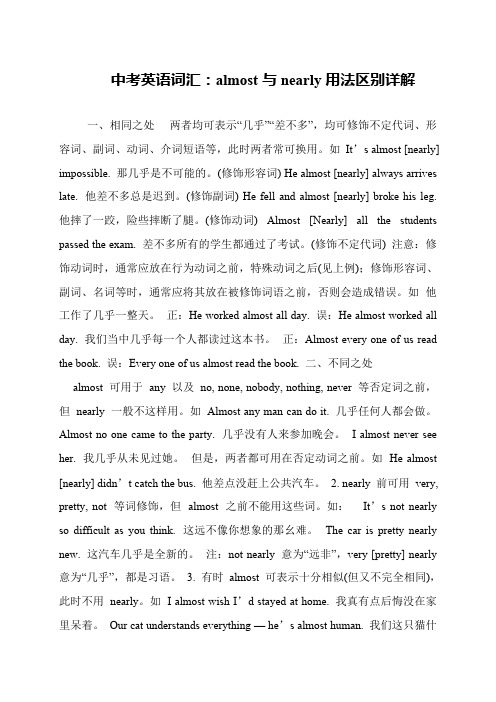
中考英语词汇:almost与nearly用法区别详解一、相同之处两者均可表示“几乎”“差不多”,均可修饰不定代词、形容词、副词、动词、介词短语等,此时两者常可换用。
如It’s almost [nearly] impossible. 那几乎是不可能的。
(修饰形容词) He almost [nearly] always arrives late. 他差不多总是迟到。
(修饰副词) He fell and almost [nearly] broke his leg. 他摔了一跤,险些摔断了腿。
(修饰动词) Almost [Nearly] all the students passed the exam. 差不多所有的学生都通过了考试。
(修饰不定代词) 注意:修饰动词时,通常应放在行为动词之前,特殊动词之后(见上例);修饰形容词、副词、名词等时,通常应将其放在被修饰词语之前,否则会造成错误。
如他工作了几乎一整天。
正:He worked almost all day. 误:He almost worked all day. 我们当中几乎每一个人都读过这本书。
正:Almost every one of us read the book. 误:Every one of us almost read the book. 二、不同之处 almost 可用于any 以及no, none, nobody, nothing, never 等否定词之前,但nearly 一般不这样用。
如Almost any man can do it. 几乎任何人都会做。
Almost no one came to the party. 几乎没有人来参加晚会。
I almost never see her. 我几乎从未见过她。
但是,两者都可用在否定动词之前。
如He almost [nearly] didn’t catch the bus. 他差点没赶上公共汽车。
2014扬州中考英语词语辨析:almostnearly

2014扬州中考英语词语辨析:almostnearly
店铺中考频道在考试后及时公布各科中考试题答案和中考作文及试卷专家点评,请广大考生家长关注。
时光飞逝,暑假过去了,新学期开始了,不管情愿与否,无论准备与否,我们已走进初三,走近我们的梦!祝愿决战2014中考的新初三学员能加倍努力,在2014年中考中也能取得优异的成绩。
almost/ nearly
Ⅰ. almost“差不多、几乎”有very, nearly 的意思。
如:
① He has almost finished his work. 他差不多完成了他的工作。
② Almost no one took any rest. 几乎没有一个人休息一下。
Ⅱ. nearly “差不多、几乎、将近”指一差距一般比almost 大。
如:
① It’s nearly five o’clock.差不多五点钟了。
② Nearly everyone knows it. 几乎每个人都知道这个。
③ He’s nearly ready. 他快准备好了。
[注]:almost有时可与nearly通用,但当其与no, none, nothing, never连用时,不用nearly。
如以上almost的例①可以互换,但例②则不能。
十组易混形容词_副词用法辨析

十组易混形容词_副词用法辨析一、近乎:almost/nearly/hardly/merely/equally[例1】(2010年全国卷II高考题)The island is_attractive in spring and autumn because of thepleasant weather in both seasons。
A。
partly B。
merely C. nearly D. equally【分析】选D。
均可表示“近乎、几乎”,但用法不尽相同.almost与no/any/never等搭配;而nearly 则最常与数词连用,与not连用构成not nearly,或与very/s。
连用;hardly表否定,“几乎不”;merely 表示“仅仅”;equ曲表示“同样地、同等地"。
I almost/nearly didn't get up in time。
我差点儿没及时起床.There were nearly 200 people at the meeting.与会人员接近200人。
He was very nearly caught.他险些被抓住。
Almost no one believed him.IL乎没有人相信他。
It’s not nearly as hot as last year。
不如去年那么热。
Hardly anybody came to the party。
几乎没什么人来参加晚会.I wasn't blaming anyone; I merely said errors likethis could be avoided.我不想责备任何人。
我只想说像这样的错误可以避免。
二、曾经:ever/since/once[例2 }(2006年广东省高考题)I thought she was amous, but none of my friends have_heard of her.A. evenB. everC. justD. never【分析】选B o ever用于否定句、疑问句和if从句中,表示“曾经”,时态不定;since用作副词表示“从那以后”,使用完成时;once“曾经”,使用过去时,描述过去一度发生的动作或状态.Have you ever thought of changing your job?你曾考虑换工作没有?We were divorced two years ago and she has sinceremarried。
- 1、下载文档前请自行甄别文档内容的完整性,平台不提供额外的编辑、内容补充、找答案等附加服务。
- 2、"仅部分预览"的文档,不可在线预览部分如存在完整性等问题,可反馈申请退款(可完整预览的文档不适用该条件!)。
- 3、如文档侵犯您的权益,请联系客服反馈,我们会尽快为您处理(人工客服工作时间:9:00-18:30)。
副词almost, nearly 用法辨析
课文中有这样一个句子:-He isn't particular about his food. -Yes, he eats ______ anything.
A. nearly
B. almost
C. mostly
问:为什么该题的最佳答案是almost?
答:首先让我们看看这三个选项的意思各是什么。
1. almost=very nearly,表示"几乎、差不多",常可互换使用。
例如:
It's almost/nearly ten o'clock.差不多10点了。
He fell off a tree and almost/nearly died.他从树上摔下来,几乎丧命。
析:从事实角度讲,almost比nearly的差距更小。
从说话人的心理角度来讲, almost暗含"还有距离",nearly暗含"似无差别"。
比如上面的例句,第一句用almost比nearly反映出时间更接近10点,但用almost反映出说话人的心理活动是"还差一点儿才到10点",若用nearly则反映出说话人的心理活动是"可以说已到10点了"。
第2句也是这样:用almost反映出说话人的心理活动是"还活着";用nearly反映出说话人的心理活动是"快死了"。
所以用almost,还是使用nearly,说话人的心理活动是关键。
.
2. almost和nearly可互换使用的场合
(1)在肯定句中
The old man is almost/nearly 90 years old.这个老人快90岁了。
(2)修饰all, every, always等时
I go to bed at ten almost/nearly every day.我几乎每天都是10点钟上床睡觉。
(3)在行为动词的否定式前
He almost/nearly didn't hear what I said.他几乎没听到我讲些什么。
3.只能用almost的场合
(1)修饰no, none, never, any以及由no或any的合成词。
例如:
I have almost nothing to do today.今天我几乎没什么事可做。
This word is to be found in almost any
dictionary.这个词几乎在任何一本词典中都可以查到。
There is almost none left.几乎什么也没留下。
(2)修饰表示感觉或心理的动词或形容词。
例如:
I almost think you are right.我还不完全相信你是对的。
(3)修饰more than和too。
例如:
That's almost too much.这简直是太过分了。
4.只能用nearly的场合
(1)被very, not, pretty修饰时。
例如:
I'm not nearly ready.我还没有准备好。
I know pretty nearly all the secrets of his married life.我几乎知道他的全部婚姻生活的秘密。
注意:not nearly=far from, much less than差得远,远远不够。
例如:
There is not nearly enough money for a new car.买一部新车的钱远远不够。
"几乎不"只能用hardly,不能用nearly not也不能说almost not。
(2)表示要做什么事但后来"没有做"或"避开不做"时。
例如:
We nearly called to see you last Saturday.我们上周六差点来看你。
5. mostly用作副词,意思是"大体上、主要地、大部分、多半、通常"等。
例如:
She is mostly out on Sundays.她周日多半不在家。
The students in our school are mostly from cities.我们学校A
I'm not nearly ready.我还没有准备好。
I know pretty nearly all the secrets of his married life.我几乎知道他的全部婚姻生活的秘密。
注意:not nearly=far from, much less than差得远,远远不够。
例如:
There is not nearly enough money for a new car.买一部新车的钱远远不够。
"几乎不"只能用hardly,不能用nearly not也不能说almost not。
(2)表示要做什么事但后来"没有做"或"避开不做"时。
例如:
We nearly called to see you last Saturday.我们上周六差点来看你。
最新文件仅供参考已改成word文本。
方便更改。
